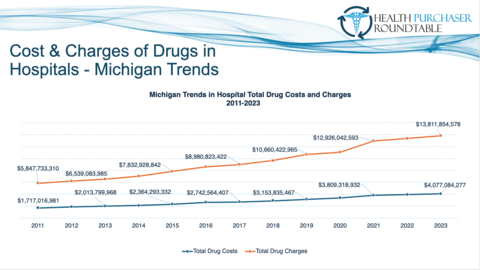Same drugs, different hospital: 18 times more expensive
Report urges hospital pricing transparency
When you go to a hospital, the same drugs can cost 18 times more, depending on the facility, according to a new report from the Michigan Health Purchasers Coalition.
The study analyzed common medications administered in hospitals and reviewed average sale prices, Bret Jackson, president of the coalition, said in a phone interview with Capitol Confidential.
“We clearly display how much hospitals are price gouging Michiganders when it comes to common drugs and the need for urgent action on transparency and accountability from the hospitals,” Jackson said. “Employers and employees are paying drastically different prices for the same drug in the same area.”
He said that a contributor to this disparity is the federal 340B Drug Pricing Program.
This program requires pharmaceutical companies to sell outpatient drugs at steep discounts to certain health care providers. Hospitals buy drugs for a lower price and sell them at a much higher price. The more they find that they can abuse the system, the more they will continue to do so, Jackson said.
The MIHPC argues that some large hospital systems exploit the program by purchasing discounted drugs and then billing insurers or patients at inflated rates.
“They are buying low and selling very, very high,” Jackson said.
Another study by the MIHPC said that more than half of Michigan hospitals profit from the 340B program. Yet, Michigan 340B hospitals provide less charity care than the national average.
Not all hospitals price-gouge, Jackson said, but large ones often do.
“The large, consolidated health systems are really taking advantage of a market distortion,” Jackson said.
Jackson urged lawmakers to act. “Policymakers need to hold them accountable; that’s the only way. I really don’t think that there is going to be a market fix to this.”
MIHPC backs Senate Bill 95, a new state transparency bill that would require hospitals participating in the 340B program to report how the savings are used. Currently, Michigan can’t track how these discounted drug revenues are spent.
“We need transparency across the board,” Jackson said. “Patients should not have to shop around and choose a different hospital within the same region due to price differences.”
Michigan Capitol Confidential is the news source produced by the Mackinac Center for Public Policy. Michigan Capitol Confidential reports with a free-market news perspective.



 Michigan House approves bills to resurrect dues skim for home health care providers
Michigan House approves bills to resurrect dues skim for home health care providers
 Supreme Court ruling could weaken renewed dues skim
Supreme Court ruling could weaken renewed dues skim
 State health dept. classed Wayne, Oakland counties as ‘partially rural’ when seeking federal grant
State health dept. classed Wayne, Oakland counties as ‘partially rural’ when seeking federal grant